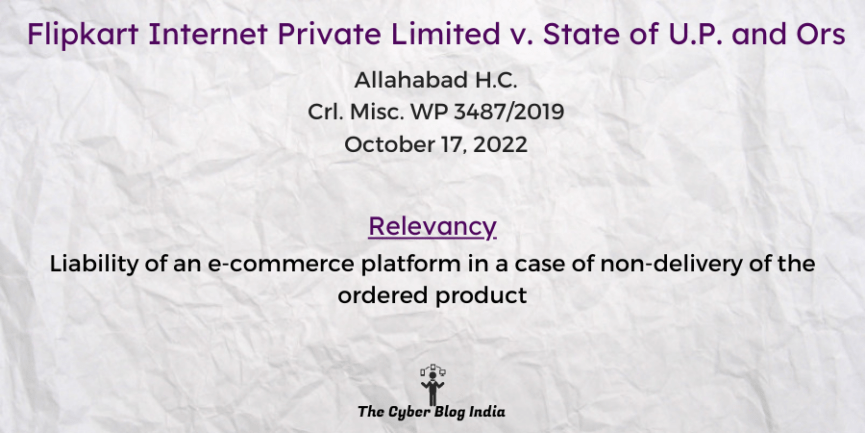Flipkart Internet Private Limited v. State of U.P. and Ors

Flipkart Internet Private Limited v. State of U.P. and Ors
(2022) 6 All LJ 789
In the High Court of Allahabad
Crl. Misc. WP 3487/2019
Before Justice Suneet Kumar and Justice Syed Waiz Mian
Decided on October 17, 2022
Relevancy of the case: Liability of an e-commerce platform in a case of non-delivery of the ordered product
Statutes and Provisions Involved
- The Information Technology Act, 2000 (Section 2(1)(w), 79, 81, 87)
- The Indian Penal Code, 1860 (Section 406, 420, 467, 468, 471, 474, 474-A)
- The Information Technology (Intermediaries Guidelines) Rules, 2011 (Rule 3)
Relevant Facts of the Case
- The fourth respondent (R4) is a regular customer of the sellers on the petitioner’s website, knowing of the good quality of products.
- R4 ordered a laptop and paid ₹ 17,990/- accordingly online for the same. The delivery was not per specifications since the processor was of the ‘AMD’ brand instead of ‘Intel’.
- R4 lodged a complaint with the petitioner, which was taken up per their Dispute Redressal Policy with the seller (Tech Connect Retail Private Limited). However, the seller denied a replacement or refund to the fourth respondent.
- Aggrieved by this, he lodged a criminal complaint with the police.
Prominent Arguments by the Advocates
- The petitioner’s counsel submitted that the petitioner is an intermediary per Section 2(1)(w) of the Information Technology Act, 2000. It only gives a platform to buyers and sellers who have independent transactions according to the Terms of Use. It is neither a party nor involved and thus is protected under Section 79 of the Act. Further, the fourth respondent has filed the impugned FIR to destroy its customer base and goodwill.
- The fourth respondent’s counsel submitted that the petitioner hatched a criminal conspiracy with the seller.
Opinion of the Bench
- The petitioner is exempt from any liability under Section 79 of the Act. No violation can be attributed against the intermediary’s officers or directors since they would be vicarious. Also, initiated proceedings would be unjust and bad in law.
- Under Section 79, there is no apparent distinction between passive and active intermediaries regarding the availability of the safe harbour provisions.
- The bench relied on State of Karnataka v. L. Muniswamy & Ors. ((1977) 2 SCC 699) to reiterate the powers of the High Court to quash proceedings to prevent abuse of the court process or to meet the ends of justice.
Final Decision
- The bench allowed the writ petition and quashed the impugned FIR and police report.
